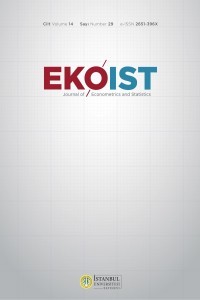WTI (West Texas Intermediate) Ham Petrol Fiyatları için Markov Rejim Değişim Otoregresif Modeli
Rejim değişim, Markov Rejim Değişim Otoregresif Modelleri, Ham petrol, Lineer-olmayan, Durağanlık durumu
Markov Switching Autoregressive Model for WTI Crude Oil Price
Regime change, Markov Switching Autoregressive Models, Crude Oil,
___
- Ahdikari, R. & Agrawal, R. K. (2013). An introductory study on time series modeling and forecasting. Lambert Academic Publishing. Retrieved from: https://arxiv.org/ftp/arxiv/ papers/1302/1302.6613.pdf
- Ailliot, P. & Monbet, V. (2012). Markov-switching autoregressive models for wind time series. Environmental Modelling and Software, 30, 92‒101. https://doi.org/10.1016/j. envsoft.2011.10.011
- Barunik J. & Malinska, B. (2015). Forecasting the term structure of crude oil futures price with neural networks. Elsevier, 2‒26. Retrieved from: https://arxiv.org/pdf/1504.04819.pdf
- Bayat, T., Kayhan, S. ve Koçyiğit, A. (2013). Türkiye’de işsizliğin asimetrik davranışının Rejim Değişim Modeliyle incelenmesi. Business and Economics Research Journal, 4(2), 79‒90. http://docplayer.biz.tr/5976565-Turkiye-de-issizligin-asimetrik-davranisinin-rejim-degisimmodeliyle-incelenmesi.html adresinden edinilmiştir.
- Chen, S. S. (2014). Forecasting crude oil price movements with oil - sensitive stocks. Economic Inquiry, 52(2), 830‒844. https://doi.org/10.1111/ecin.12053
- Çinko, M. (2006). İstanbul Menkul Kıymetler Borsası 100 Endeksinin doğrusallık testi. Ekonometri ve İstatistik e-Dergisi, 3, 23‒31. http://eidergisi.istanbul.edu.tr/sayi3/iueis3m2.pdf adresinden edinilmiştir.
- Engel, C. & Rogers, J. H. (2006). The U.S. current account deficit and the expected share of world output. Journal of Monetary Economics, 53(5), 1063‒1093. Retrieved from: https://www.ssc.wisc.edu/~cengel/PublishedPapers/CarnegieRochesterCAcct.pdf
- Fattouh, B. (2005). Capital mobility and sustainability evidence from U.S. current account data. Empirical Economics, 30(1), 245‒253. https://doi.org/10.1007/s00181-004-0232-6
- Hamilton, J. D. (1983). Oil and the macro economy since World War II. The Journal of Political Economy, 91(2), 228–248. http://www.jstor.org/stable/1832055
- Hamilton, J. D. (1989). A new approach to the economic analysis of non-stationary time series and the business cycle. Econometrica, 57(2), 357‒384. https://doi.org/10.2307/1912559
- Hamilton, J. D. (2005). Regime Switching Models. Retrieved from: http://econweb.ucsd.edu/~jhamilton/palgrav1.pdf
- Hamilton, J. D. (2009). Causes and consequences of the oil shock of 2007–08. The National Bureau of Economic Research, 40(1), 215‒283. https://doi.org/10.3386/w15002 http://lipas.uwasa.fi/~bepa/Markov.pdf
- Huang, S., An, H., Wen, S. & An, F. (2017). Revisiting driving factors of oil price shocks across time scales. Energy, 139(C), 617–629. https://dx.doi.org/10.1016/j.energy.2017.07.158
- Karahan H. (2014). Petrol piyasalarında neler oluyor? SETA Perspektif, 79. https://paperzz.com/doc/5060375/petrol-piyasalar%C4%B1nda-neler-oluyor%3F
- King K., Deng A. & Metz D. (2012). An econometric analysis of oil price movements: the role of political events and economic news, financial trading, and market fundamentals. Bates White Economic Consulting. Retrieved from: https://www.bateswhite.com/assets/htmldocuments/media.768.pdf
- Kuan, C. M. (2002). Lecture on the Markov Switching Model. Retrieved from: http://homepage.ntu.edu.tw/~ckuan/pdf/Lec-Markov_note.pdf
- Middendorf, T. & Schmidt, T. (2004). Characterizing movements of the U.S. current accountdeficit. RWI Discussion Paper, 24. http://dx.doi.org/10.2139/ssrn.628461
- Mir, A. M., Osborn, D. R. & Lombardi, M. J. (2005). The effects of seasonal adjustment on the properties of business cycle regimes. Journal of Applied Econometrics, 23(2), 257‒278. https://doi.org/10.1002/jae.980
- Pape, B. (2005). Regime switching models. Lecture Notes, 31‒43. Retrieved from: http://lipas.uwasa.fi/~bepa/Markov.pdf
- Psaradakis, Z. & Spagnolo, N. (2003). On the determination of the number of regimes in Markov-Switching Autoregressive Models. Journal of Time Series Analysis, 24(2), 237‒252. https://doi.org/10.1111/1467-9892.00305
- Skalin, J. & Trasvirta, T. (2000). Modelling asymmetries and moving equilibria in unemployment rates. Macroeconomics Dynamics, 6(2), 202‒241. https://doi.org/10.1017/S1365100502031024
- Solak, A. O. (2012). Petrol fiyatlarını belirleyici faktörler. International Journal of Alanya Faculty of Business, 4(2), 117‒124. http://dergipark.gov.tr/download/article-file/201632
- Sümer, K. ve Hepsağ, A. (2007). Finansal varlık modelleri çerçevesinde piyasa risklerinin hesaplanması: parametrik olmayan yaklaşım, Bankacılar Dergisi, 62, 3‒24. https://www.tbb.org.tr/Dosyalar/Arastirma_ve_Raporlar/finansalvarlik.pdf adresinden edinilmiştir.
- Ural, M. (2016). The impact of the global financial crisis on crude oil price volatility. Yönetim ve Ekonomi Araştırmaları Dergisi, 14(2), 64‒76. http://dx.doi.org/10.11611/JMER810
- Wong, V. S. & El Massah, S. (2017). Recent evidence on the oil price shocks on gulf corporation council stock markets. International Journal of the Economics of Business, 1–16, https://doi.org/10.1080/13571516.2017.1379216
- Yin, X., Peng, J. & Tang, T. (2018). Improving the forecasting accuracy of crude oil prices. Sustainability, 10(2), 454. https://doi.org/10.3390/su10020454
- Başlangıç: 2005
- Yayıncı: İstanbul Üniversitesi
Abdullah Emre ÇAĞLAR, Çiğdem DEMİR
Fisher Hipotezinin MINT Ülkeleri İçin İncelenmesi: Eşik Değerli Adl Eşbütünleşme Testi Yaklaşımı
WTI (West Texas Intermediate) Ham Petrol Fiyatları için Markov Rejim Değişim Otoregresif Modeli
Lojistik Regresyon Analizi ile Pisa Araştırmasında Öğrenci Başarısının Modellenmesi
